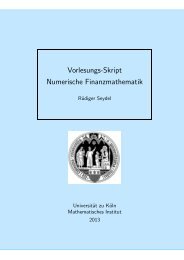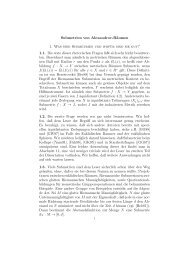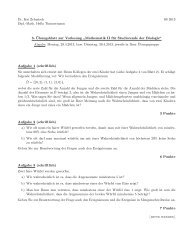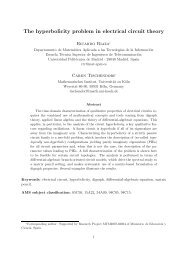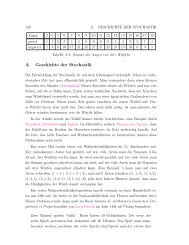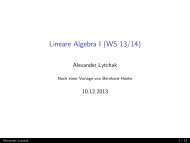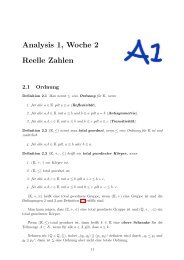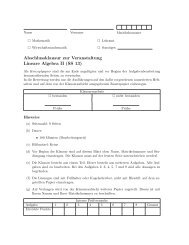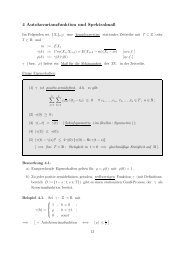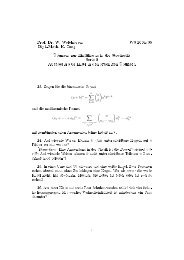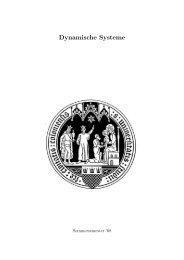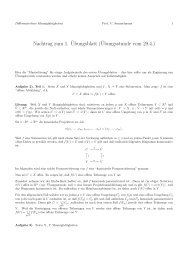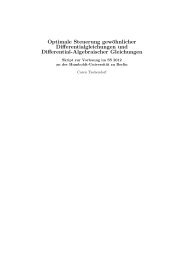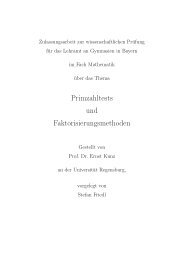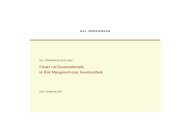Inhaltsverzeichnis - Mathematisches Institut der Universität zu Köln
Inhaltsverzeichnis - Mathematisches Institut der Universität zu Köln
Inhaltsverzeichnis - Mathematisches Institut der Universität zu Köln
You also want an ePaper? Increase the reach of your titles
YUMPU automatically turns print PDFs into web optimized ePapers that Google loves.
DMV Tagung 2011 - <strong>Köln</strong>, 19. - 22. September<br />
Sebastian Herpel<br />
Ruhr <strong>Universität</strong> Bochum<br />
On the smoothness of centralizers in reductive groups<br />
Let G be a connected reductive algebraic group over an algebraically closed field. The question whether<br />
the scheme-theoretic centralizer of a closed subgroup of G is smooth, or equivalently whether the<br />
dimensions of the global and infinitesimal centralizers coincide, occurs naturally in many contexts. We<br />
introduce a condition for the characteristic of the ground field that is slightly weaker than the notion<br />
of “very good” characteristic. We go on to show that this condition is necessary and sufficient for the<br />
smoothness of all centralizers of closed subgroup schemes. Reductive groups defined in such “pretty<br />
good” characteristic are closely related to so called standard groups, for instance to groups satisfying the<br />
standard hypotheses of Jantzen.<br />
Gerhard Hiß<br />
RWTH Aachen<br />
Hecke algebras in representation theory<br />
Hecke algebras i.e., endomorphism rings of suitable modules of group algebras, constitute an essential<br />
tool in the representation theory of finite groups. In groups of Lie types, Hecke algebras also arise as<br />
deformations of group algebras of Weyl groups. In this area, applications of Hecke algebras are rather<br />
varied: in non-defining characteristics Hecke algebras serve to classify irreducible representations, in<br />
defining characteristics a famous conjecture of Alperin can be proved with the help of Hecke algebras.<br />
A possible generalisation of this approach to arbitrary groups is investigated in a recent joint paper with<br />
Steffen König and Natalie Naehrig. A further area of applications of Hecke algebras are the condensation<br />
methods in computational representation theory. My talk will give a survey, largely free of technical details,<br />
on the various applications of Hecke algebras.<br />
Bernhard Keller<br />
Université Paris Di<strong>der</strong>ot<br />
Quiver mutation and quantum dilogarithm identities<br />
Quiver mutation is an elementary operation on quivers which appeared in physics in Seiberg duality in<br />
the 1990s and in mathematics in Fomin-Zelevinsky’s definition of cluster algebras in 2002. In this talk,<br />
I will show how, by comparing sequences of quiver mutations, one can construct identities between<br />
products of quantum dilogarithm series. These identities generalize the classical pentagon identity of<br />
Faddeev-Kashaev-Volkov and the identities obtained recently by Reineke. Morally, the new identities<br />
follow from Kontsevich-Soibelman’s theory of refined Donaldson-Thomas invariants. They can be proved<br />
rigorously using the theory linking cluster algebras to quiver representations.<br />
13



